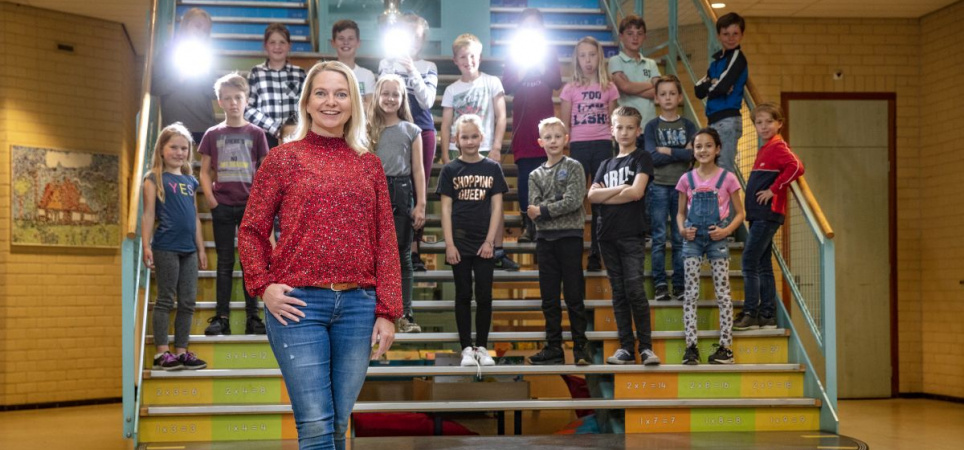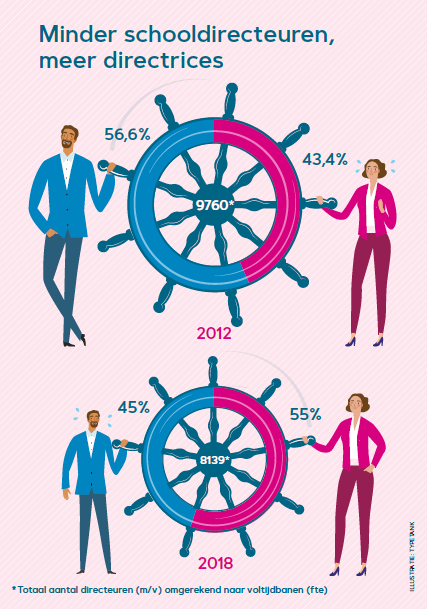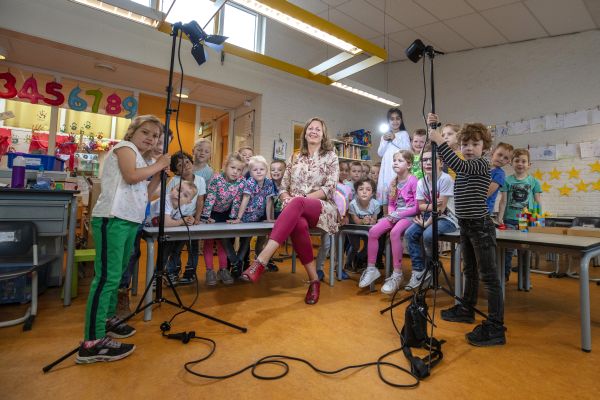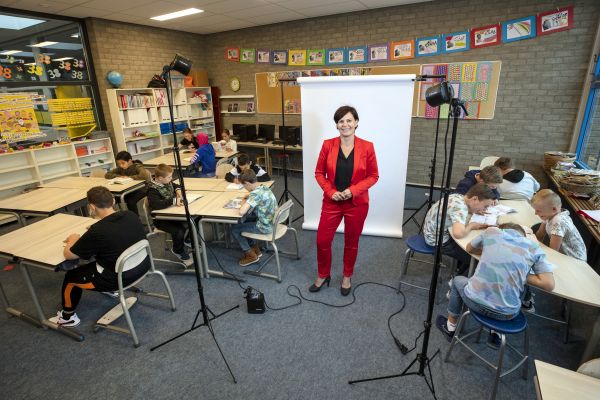School principal in primary education is more often a woman
It is an archetypal image in primary education: the teacher team, consisting mainly of women, is led by a man. That picture is becoming increasingly outdated, according to figures from DUO.

Picture: Fred van Diem
The director of primary school De Klimop in the TV series De Luizen Moeder should have been called Anne instead of Anton. Six years ago, the share of female directors in primary education, measured in full-time jobs (full-time equivalents: FTE), was still 43 percent. This school year it will be 55 percent, according to data from the DUO executive organization. The figures show steady growth every year.
Since 2012, a total of 237 more full-time executive jobs have been filled by women, an increase of just under 6 percent. The number of male directors has decreased by 1.859 FTEs, a decrease of almost 34 percent. The total number of management positions has also decreased, more on that in a moment.
The increase in female management positions is not evenly distributed across the country. DUO has broken down the personnel figures over 39 regions and urban areas in the Netherlands. Utrecht is at the top: there, 70 percent of management jobs are filled by women. A significant increase since 2012, when that share was still around 54 percent.
 Most male directors are in the Northwest Veluwe region. There, only 35 percent of management jobs are in female hands. Yet here too, management boards are feminised compared to six years ago. In 2012, only one in five school leaders here was female.
Most male directors are in the Northwest Veluwe region. There, only 35 percent of management jobs are in female hands. Yet here too, management boards are feminised compared to six years ago. In 2012, only one in five school leaders here was female.
Fewer directors
In the background is another trend: the total number of directors in primary education has decreased by more than 2012 full-time jobs since 1.600, or almost 17 percent. Demographic shrinkage and schools that merge or close, directors who take part in the classroom due to the teacher shortage (part-time), management vacancies that cannot be filled and are taken care of in a different way, these are factors that can play a role in this.
The primary school principal is at the head of a team of teachers, often mostly women. That is still the case. 15 percent of teacher jobs in primary education are carried out by men. In fact, the proportion of men has decreased slightly again in recent years. Within primary education, special education stands out: over a quarter of the teaching staff there are male.
All functions added together, feminization continues in primary education. Of the 125 thousand full-time jobs this school year, just under 82 percent are filled by women. Six years ago this was almost 78 percent.
'Status is not important to me'

Annemieke Westra (image: Fred van Diem)
Annemieke Westra (44) is director of Kindcentrum de Borg in Assen: “From my start here I have had a different wind blow through the school and later the child center. That will have little to do with the fact that I am a woman, it mainly says something about my character and leadership style. I am a connector, result-oriented and have an eye for people. I think it is important that the expertise of employees is used in the interest of the children. We do it together. You never hear me say: 'I am a director', when people ask me what I do. No: "I work in education." Status is not important to me.
At the previous location where I worked as director, and now at the Borg, I have consciously appointed coordinators to create shared responsibility in the interest of the children. In this way, I also offer the staff development opportunities. I always say to my staff, mostly women, "Take the opportunities that arise." This is how my career started. And if there are colleagues who might also want to have a position as director, I say: 'Just come along for a day.' Then they can see and feel for themselves how beautiful it is. And how varied.
When I started as Deputy Director in 2008, the foundation had more male directors than women. Over the years, more and more women have been hired as directors.
When I started as Deputy Director in 2008, the foundation had more male directors than women. Over the years, more and more women have been hired as directors. I think that is a positive development. As far as I am concerned, this development should also take place among administrators. The male percentage among drivers is still very high there, I think. I see a combination of men and women at the top as an ideal. When men and women work together in the development of their leadership, a win-win situation arises. I would like to become a director one day. But for now I still really enjoy the workplace, where I literally still have my feet on it. Making decisions makes me happy, but also half an hour at the square. ”
'This was always my dream'

Jennifer Saris (image: Fred van Diem)
Jennifer Saris (43) works in special primary education as a director at De Steenen Kamer in Zwijndrecht: “Leadership is something that is in you. You have to enjoy being at the helm, making decisions and you have to be able to handle the fact that you don't always get all positive things over you.
I left the teacher training college in 2000 and then taught in the middle and upper classes. After a year I already knew: I want more than this. The principal who came to our school in 2010 wanted to give me the chance. I think you always need someone like that to move up. She prepared me for the position I now have, but that went very gradually. First internal supervisor, then deputy director. Now I am where I want to be.
I walk around a lot, want to see what's going on, know all the names of our students
I don't know if I have leadership qualities because I am a woman. You have soft men and hard women. And vice versa. I'm kind of in between. I am someone who likes to take initiative, pull the cart, stand at the front. That does not mean that I like to do everything on my own: I have nothing to do with hierarchy, here at school we do it together and I believe in that. I walk around a lot, want to see what's going on, know all the names of our students; we have 173. I am quite proud of it. I don't want to be the director yelling from the ivory turret, "Hey you there, with those blonde hair."
I work 0,9 FTE, because I also have two children. But the practice is more unruly: I am at home on Wednesday and Friday afternoons, but I can always be reached. With love, by the way. I like nothing more than this job. However, it is important that you continue to visit people around you, such as fellow directors. My father used to run his own company and always said to me: it's lonely at the top. I am not lonely, but I do see that colleagues benefit from each other a lot. I am the only director here. That is why I am looking for directors of our school community. If I have to chop with an ax that I have never chopped with before, it is nice to ask: how would you do it? ”
'I do it with so much love'

Heidi van Wezel (image: Fred van Diem)
Heidi van Wezel (46) comes from the business world and now works as a director at primary school De Kameleon in Den Dolder: “For ten years I worked in the corporate world, mainly in the financial world. When I was thirty I went out and did the addition: am I going to continue with this or do I do something else?
Then that old dream came up again. Become a teacher. I started doing the teacher training college and that is how I ended up in education. First as a teaching assistant, later as a teacher at a primary school in Utrecht. I applied in Den Dolder because I really wanted to work at a village school: I like it when a school is part of the community.
When I started as director, I wanted to keep control. I have come back to that. It didn't work for me. Now I put the responsibilities low in the organization, I try to inspire others. I think you are a good director if you not only empower yourself, but also let others shine. That is actually much more fun, to see how your colleagues get the best out of themselves.
My husband understands that I have to answer that one phone call at a Sunday night dinner. That I have to go to school during the holidays if there are calamities with the building.
Every day I start by greeting the parents and the children in the hall. I realize that I am the face of the school to the outside world, especially in a community like Den Dolder. And I am aware that, as an integrated child center, we run a business. For a long time I thought that you could only become a school principal if you had your feet in the clay. Now I look at it differently. It is also just a bit of entrepreneurship, so you can come out of the business world and run a school, as long as you know what the subject looks like, what challenges teachers face.
What is very important to me: a home front that supports you. My husband understands that I have to answer that one phone call at a Sunday night dinner. That I have to go to school during the holidays if there are calamities with the building. And that I take home the worries about a sick pupil or a teacher who is not feeling well. But you know? This is my passion. This responsibility makes me happy. ”
This article is from the July issue of the Education Magazine


